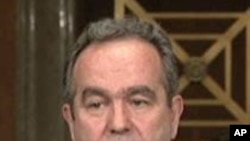The United States will hold a new round of talks in coming weeks with Burma's military government as part of the Obama administration's new approach of pragmatic engagement with Burma
Assistant Secretary of State for East Asia and Pacific Affairs, Kurt Campbell, spoke about the planned talks during his testimony to the House of Representatives Foreign Affairs Committee.
"We intend to go to Burma in the next few weeks for a fact-finding mission," said Kurt Campbell. "During that trip we will talk to the Burmese government, representatives of the ethnic nationalities, and the democratic opposition, including the NLD [the National League for Democracy], Aung San Suu Kyi, and others."
Asked what specific things the U.S. would hope to accomplish, Campbell listed goals of promoting a dialogue between various groups within Burma, and seeking reassurances regarding concerns the U.S has about ties between Burma and North Korea.
Campbell reiterated what he told a U.S. Senate committee several weeks ago - that there can be no lifting of unilateral U.S. sanctions without meaningful progress on core concerns.
Members of Congress are generally supportive though cautiously skeptical regarding the Obama administration's approach, hoping it can lead to some degree of progress on democracy, human rights and political issues.
Two exceptions are Ileana Ros-Lehtinen, the senior Republican on the committee, and California Republican Representative Dana Rohrabacher:
LEHTINEN: "How can anyone credibly argue that engaging the Burmese regime with new carrots, however fresh, particularly as its behavior is getting markedly worse, advanced U.S. security interests and our foreign policy priorities?"
ROHRBACHER: "For us to be expanding our relationships, opening up ties with the Burmese junta is the worst possible course of action. It is immoral. It is going to send the wrong message to the Burmese dictatorship, it's going to send the wrong message to the Burmese people."
Other witnesses stressed their view that engagement must be disciplined, based on an expectation of concrete results.
Tom Malinowski of Human Rights Watch says the Obama administration is embarking on a realistic course that places the burden on Burma's military leaders. Coming months he says, will be a testing period.
"Are they going to be willing to allow the National League for Democracy to function normally as a political party," said Tom Malinowski. "Are they going to be willing to have a process in which they discuss substantive issues relating to the country's future, with the opposition. Are they going to release political prisoners. Are they going to change the manor in which they are going to organizes these elections next year so there is some chance for a vote that reflects the will of the Burmese people?"
Chris Beyrer, is a physician and Professor of Epidemiology Johns Hopkins Bloomberg School of Public Health and an activist on Burma issues hopes the upcoming talks can persuade the military to ease political repression.
"We should be calling for and insisting not simply that people meet with Aung San Suu Kyi, but that she gets to meet with her party, that she gets to be properly briefed, that the central executive committee of her party gets to meet and debate this policy and discuss it, and without surveillance and junta minders and guards, and not at their convenience entirely, so not just that she is taken to a guest house to meet with a visiting dignitary but that they really are allowed to begin a substantive debate on this new policy," said Chris Beyrer.
Aung Din, Executive Director of the U.S. Campaign for Burma, says the Obama administration must implement its new approach with caution, transparency and a sense of urgency.
He says the U.S. could respond to any positive gestures by Burma's military during bilateral talks, such as the release of Aung San Suu Kyi and other political prisoners, with an easing of sanctions, but adds Washington must be ready to respond to negative developments as well.
"If the regime continues arresting democracy activists and attacking ethnic minorities, the U.S. must respond with tightening sanctions, organizing action at the U.N. Security Council, such as a global arms embargo, and establishment of a commission of inquiry to investigate crimes against humanity in Burma," said Aung Din.
In his testimony on Wednesday, Assistant Secretary of State Campbell referred to private talks the U.S. has had with countries surrounding Burma, that included discussion of growing links between Burma and North Korea.
While U.S. sanctions policy has received very little support from Southeast Asian nations, Campbell said anxiety about Burmese links with North Korea could provide more room for dialogue on steps that could be taken if upcoming talks don't lead to some progress.
Campbell said lack of progress with Burma on issues relating to implementation of U.N. Security Council Resolution 1874, involving commercial and economic sanctions on North Korea and searches of North Korean cargo vessels, would produce what he called a much higher level of concern in the U.S. government regarding Burma.
News
US Plans New Talks with Burma

<!-- IMAGE -->



